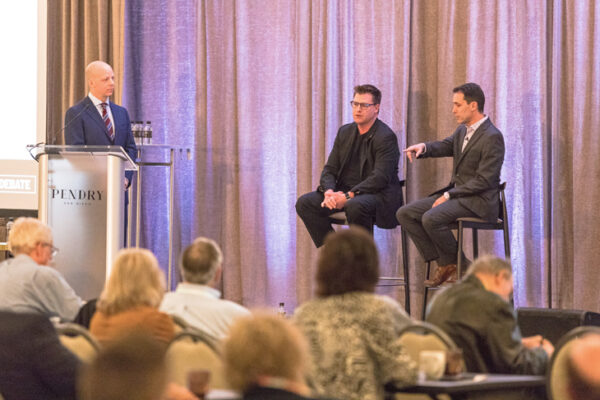The Second Best Way to Get Rich
A couple years ago, I bumped into John Dessauer, editor of John Dessauer’s Outlook, at the exhibit hall of The MoneyShow in Orlando.
He spied The Oxford Club logo on my lapel.
“I know Bill Bonner,” he said, referring to the Founder and Chairman of Agora Publishing, the parent of The Oxford Club. “I worked for him when he was broke.”
I smiled and nodded. “He’s not broke now.”
More than 30 years ago, Bill founded a tiny company that has become the world’s largest publisher of health, travel and investment letters, becoming a near-billionaire in the process.
He once told me that the company survived the early years only because he “was a pretty good copywriter… and a pretty good plumber.”
I’m not sure how he did it. Bill claims he doesn’t know either.
Yes, he understands the industry, devoted his life to it and hired some smart people who hired a lot of other smart people. But, in my experience, Agora is truly a one-off.
Newbies find the freewheeling, largely unstructured, internally competitive, risk-prone nature of the company either totally invigorating or completely petrifying. Employees are encouraged to be creative, ambitious and entrepreneurial and are given plenty of freedom and incentives – or enough rope to hang themselves, depending on how you look at it.
When Bill Bonner gives advice – which he rarely does even when solicited – it generally pays to listen.
“More Than Just Annual Profits”
Yet I’ve found myself in disagreement with him lately. In his first Daily Reckoning column of 2015, he argued that the best way to generate and preserve wealth is not investing in the stock market but starting your own business.
According to Bill:
“Owning and controlling a business is a much better way to make money [than owning stocks].
“As a general rule, the closer you are to the source of earnings, the more you are likely to get. When you control a business, you make sure you get your share of the profits. When someone else controls the business, he often makes sure you don’t.
“Owning your own business brings you more than just the annual profits. You also can get employment, use of company cars and real estate, and a business credit card to cover some of your expenses. You get invited to the company holiday party, too.
“And if you pay attention, you understand how the business works and what it is worth.
“This is different from the passive owner of a few publicly traded shares.”
Indeed, it is. And yet…
Do You Have What It Takes?
According to the U.S. Bureau of Labor Statistics, the majority of new businesses fail within the first four years. That’s a daunting consideration for anyone contemplating a new enterprise.
You may not have enough money to start a business – or access to enough capital to keep it going.
Consider the time involved, commonly known as “the burden of retail.” As a new business owner, you will be the first to arrive, the last to leave and the last to get paid.
Do you have the expertise? Do you know your market? Will you be able to balance the competing demands of customers, suppliers, employees and creditors?
Do you have a knack for hiring good people? That can be a tricky business. In my experience as a manager, I found that roughly 20% of employees do more than what they’re asked, take whatever actions are needed to get a job done, learn the skills they need to help the business and their career, and are the foundation of everything you do. (Your biggest problem will be challenging and retaining them.) Seventy-five percent of employees do no more or less than what’s required and are in the parking lot by 5:01. (That’s fine, incidentally. They work to live and find fulfillment elsewhere.) The other 5% tend to be gadabouts, shirkers, malingerers or troublemakers and need to be shown the door as quickly as possible.
This is tiring. At least it was for me.
Even if your business is a roaring success, that may change. A family in my hometown owned a profitable furniture store for generations. Within a matter of months, it went bust.
I used to know a lot of wealthy homebuilders. Today I know none.
There are quality of life issues, too. When you run a business, it is never far from your mind. You spend a lot of time with bookkeepers, lawyers, tax consultants, disgruntled employees and dissatisfied customers. Is this how you want to spend your day?
That’s why I prefer another type of business ownership: stocks, the best performing asset of the last 200 years.
A Whole Lot Simpler
Even if you lack the time, the investment capital or the experience necessary to found and run a successful business, with even a modest amount of money you can accumulate a stake in many of the world’s greatest businesses.
And it’s easy. A click of the mouse, a five-dollar commission, and you’re in. Another click – another five bucks – and you’re out. (Compare that to your typical real estate closing.)
Owning a piece of a company is a whole lot simpler than running one. You don’t have to take out loans, sign personal guarantees, hire or fire employees, grapple with an avalanche of federal mandates and regulations, pay lawyers and accountants, or even show up for work. How great is that?
Some Americans today obsess over the issue of fairness. But the stock market shines here, too. If I own shares of Microsoft, for example, my gain over the next year will be exactly the same as the world’s richest man. Sure, Bill Gates may own a few more shares than I do, but our percentage returns will be the same.
Monitoring your portfolio has never been simpler either. You used to have to dig the price of your stocks out of the business section of the paper. (When was the last time you did that?) Or you could call your broker, get placed on hold for a few minutes, and eventually get a quote that – by the time you received it – was no longer current.
Today you don’t think twice about getting a real-time quote, placing a trade with a click and getting a near instantaneous confirmation.
Costs used to be exponentially higher too. Brokers routinely sold mutual funds with front-end loads as high as 8.5%. (That’s not a misprint.)
Prior to May 1, 1975, brokerage commissions were steep – and fixed by law. Deregulation – and the debut of Charles Schwab – changed that. The Internet steamrolled costs further still.
Spreads are far thinner today, too. When I started in the brokerage business 30 years ago, a large stock might have an eighth of a point spread and a small one a quarter of a point. Tack on a two or three percent commission and you were down 5% by the time you got your trade confirmation.
Today – thanks, in part, to wrongly detested, high-frequency traders – liquidity is greater than ever and bid/ask spreads are often a penny.
The Easiest Way to Build a Fortune
Your investment choices have never been greater. Information has never been more widely available. Monitoring your portfolio has never been simpler. Spreads have never been thinner. Commissions have never been lower. Executions have never been swifter.
Owning a diversified portfolio of stocks is far less risky than tying up your money – and your life – in a single company.
Moreover, the same factors that could undermine a publicly traded company – debt, competition, inflation, a weak economy, etc. – can just as easily hurt a privately held one.
True, private business owners don’t see a share price that suddenly belly flops from time to time. But every business is fluctuating in value each day, whether you see it or not.
Owning a diversified portfolio of high-quality stocks means you will definitely experience neck-snapping volatility from time to time. That’s the price of admission. But if you have the patience and the temperament, it is the safest, easiest and most liquid way to build a fortune.
Bill’s suggestion? That’s the second best way.
[adzerk-get-ad zone="245143" size="4"]About Alexander Green
Alexander Green is the Chief Investment Strategist of The Oxford Club, the world’s largest financial fellowship. For 16 years, Alex worked as an investment advisor, research analyst and portfolio manager on Wall Street. After developing his extensive knowledge and achieving financial independence, he retired at the age of 43.
Since then, he has been living “the second half of his life.” He runs The Oxford Communiqué, one of the most highly regarded publications in the industry. He also operates three fast-paced trading services: The Momentum Alert, The Insider Alert and Oxford Microcap Trader. In addition, he writes for Liberty Through Wealth, a free daily e-letter focused on financial freedom.
Alex is also the author of four New York Times bestselling books: The Gone Fishin’ Portfolio: Get Wise, Get Wealthy… and Get On With Your Life; The Secret of Shelter Island: Money and What Matters; Beyond Wealth: The Road Map to a Rich Life; and An Embarrassment of Riches: Tapping Into the World’s Greatest Legacy of Wealth.






